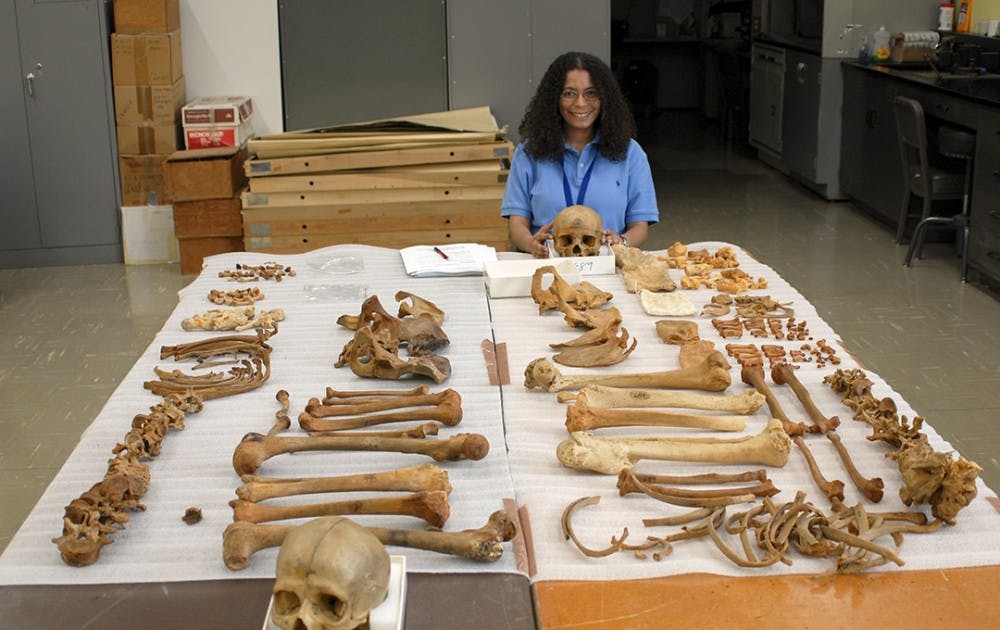Carlina De La Cova has been fascinated by ancient humans since her childhood. In 2011, she came to USC to pursue that interest. She quickly rose to become an associate professor in the anthropology department and this year she received the 2018 Mungo Undergraduate Teaching Award.
“From an early age, I’ve been exposed to archaeology and bioarcheology ... via National Geographic,” said De La Cova. “I was reading National Geographic at the age of eight, nine, ten onward.”
De La Cova’s work specializes in the study of paleopathology, a branch of anthropology that focuses on diseases found in human remains. Her research looks into the health and disease in the skeletons of African-Americans and Caucasians that were born during the Antebellum Period as well as during the Civil War and Reconstruction.
“I thought, well, you know my own history and my own background, being African-American, being a Southerner, being born in the South, I’ve always been invested into the experience before the war during enslavement and then how that changed after the war and what sort of happened during the war,” De La Cova said. “And so, that’s when I think my career really took off in terms of thinking about paleopathology ... and thinking about how I could really give a voice to those who have been silenced historically.”
To understand how history had impacted the health of the remains she studied, De La Cova went back and read slave narratives.
“I grew up hearing stories about slavery, hearing stories about what it was like for my maternal side of the family being enslaved and then about liberation and about that period during the war,” said De La Cova.
In reading the slave narratives, she began to see echoes of her own past come through.
“My childhood was literally the things that I’d been grown up and sort of learned that I didn’t quite understand, now I understood. That was my first a-ha moment,” said De La Cova.
De La Cova’s major turning point in her research came when she began her work. The major anatomical collections in the U.S. for biological anthropologists are the remains of individuals that were dissected in the late-19th and early-20th century. Legally, then and now, if a person dies in a public institution and no one claims his or her remains within a certain period of time, the body is automatically sent to the nearest institution of medical learning for research.
“My research sort of evolved from not only looking at the impact of, you know, the Civil War and the impact of the Antebellums or Reconstruction period ... but it evolved to really understand who these people were,” said De La Cova.
This encouraged De La Cova to think more about what she and her colleagues could do differently to engage with the skeletal collections that form the backbone of the anthropology discipline.
“It is what I call un-silencing the silence and giving the dead a voice, especially those African-Americans within these collections that got lost during the Great Migration,” said De La Cova.
To De La Cova, studying these skeletons became more than just paleopathology. It became about contextualizing the individual and learning who they were.
“The most rewarding parts of doing this research is, again, giving voices to the dead ... restoring their voices, bringing their voices and identities back to the forefront,” said De La Cova.
Those parts also bring challenges. One of the largest challenges that De La Cova has faced is that most of the biological anthropology discipline is focused on pure skeletal analysis.
“That person is not just their toe bone, they’re not just their hip bone,” said De La Cova. “That’s a complete person and we always need to remember that.”
De La Cova has watched the younger scholars, including her own graduate students, follow her message and work.
Mattie Atwell is a second-year anthropology doctoral student who works closely with De La Cova. Atwell’s work combines the historical studies with the cultural and biological. In her research, she looks at the environmental issues and cultural restraints that pertain to skeletal research. She first met De La Cova in 2011 as a student in one of De La Cova’s classes.
“Her great teaching ethic along with how she is a such holistic anthropologist in wanting to, even though she's just in the sub-field of bioanthropology, she incorporates kind of all of the aspects of anthropology to get a bigger picture of what’s going on,” said Atwell. “I think that’s what anthropology is about.”
It is that dedication to teaching and to anthropology that earned De La Cova the Mungo Undergraduate Teaching Award, which is awarded to professors who are innovative and committed to educating students.

